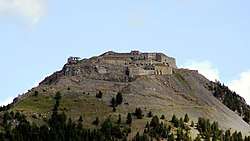Fort de l'Infernet
The Fort de l'Infernet is a fortification complex near Briançon in the French Alps. It was built as part of the Séré de Rivières system of fortifications in 1876–78 to defend France against invasion from Italy. It specifically overlooks the valley of the Durance behind and the Fort du Gondran, closer to Italy. Built at an altitude of 2,380 metres (7,810 ft), the fort was accessed by an aerial tramway, which connected to the older Fort du Randouillet at lower altitude. It was the last French fort to be built from cut stone masonry.
| Fort de l'Infernet | |
|---|---|
| Part of Alpine Line (backup), Séré de Rivières system | |
| Southeast France | |
 | |
 Fort de l'Infernet | |
| Coordinates | 44.89423°N 6.68556°E |
| Site information | |
| Owner | French military |
| Controlled by | France |
| Open to the public | No |
| Condition | Abandoned |
| Site history | |
| Materials | Stone |
| Battles/wars | Italian invasion of France |
The construction of the fort required that its mountaintop be leveled, a process that produced landslides.[1]
The 210-man garrison served an armament consisting of seven 138mm guns, five 155mm guns, two 220mm mortars, two 150mm mortars and six more 138mm guns in a separate battery. Much of the armament was placed on a cavalier or gun platform on top of the masonry barracks.[1][2] The garrison was accommodated in two barracks at somewhat lower altitude, La Cochette and La Seyte, with a portion of the total contingent rotated into the fort for duty. The aerial tramway was operated by mule power.[3]
In 1940 the fort was manned as a backup fortification to the Alpine Line fortifications of the Maginot Line program, and was bombarded on 21 and 23 June 1940 by mortars at Fort Chaberton. 280mm field mortars placed at Infernet replied, silencing the Italian battery.[1]
| Wikimedia Commons has media related to Fort de l'Infernet. |
References
- "Le fort de l'Infernet (05)". Chemins de memoire. Retrieved 20 July 2010.
- Vaubourg, Cedric & Julie. "Le fort de l'Infernet". fortiffsere.fr. Retrieved 20 July 2010.
- Brock, Mike & Ann. "Fortifications of the Franco-Italian Border; French Alps Part III". Fortifications of the Franco-Italian Border. Retrieved 21 July 2010.
External links
- Fort de l'Infernet at Chemins de mèmoire
- Fort de l'Infernet at fortiffsere.fr (in French)